What is Pope Francis’s real agenda?
IT’S WORTH CONSIDERING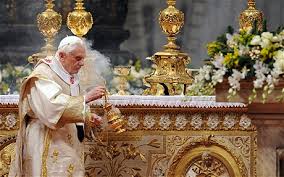
As I share the gospel where I live, the greatest obstacle I face is Roman Catholicism, especially within the Latino community. This is why I listened with great interest to the Pope’s remarks during his recent visit to the U.S. While the Catholics of the world (including nearly everyone on Fox News) and many others were gushing over his every word, I was listening closely for his real messages-those that built upon his previous proclamations regarding the world’s politics and religion.
His primary message seemed to be a call for unity among all of the world’s religions in a quest for peace. This, of course sounds wonderful to the biblically illiterate and the naive. While those in attendance appeared to be “caught up” in the moment and ready to jump on the “let’s just all get along” bandwagon, those of us who have been paying close attention cannot reconcile his lofty words with reality.
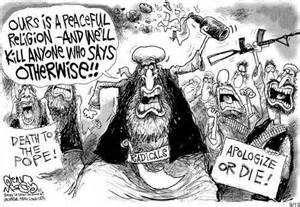 The followers of Islam, for example, have neither a desire, nor an intention of getting along with the non-Muslims of the world. The goal is world domination. This is clearly taught in the Qur’an. Yet Pope Francis once told guests at the Vatican that the Qur’an, and the spiritual teachings contained therein, are just as valid as the Holy Bible. “Jesus Christ, Mohammed, Jehovah and Allah” he said, “are all names employed to describe an entity that is distinctly the same across the world.” He implored the guests to strive to respect other religions, especially Islam. (The Vatican will meet with Muslim leaders in late February to discuss further steps to spread understanding and awareness of the Islamic religion.)
The followers of Islam, for example, have neither a desire, nor an intention of getting along with the non-Muslims of the world. The goal is world domination. This is clearly taught in the Qur’an. Yet Pope Francis once told guests at the Vatican that the Qur’an, and the spiritual teachings contained therein, are just as valid as the Holy Bible. “Jesus Christ, Mohammed, Jehovah and Allah” he said, “are all names employed to describe an entity that is distinctly the same across the world.” He implored the guests to strive to respect other religions, especially Islam. (The Vatican will meet with Muslim leaders in late February to discuss further steps to spread understanding and awareness of the Islamic religion.)
While the pontiff addressed the joint session of Congress, he seemed to be leading up to a strong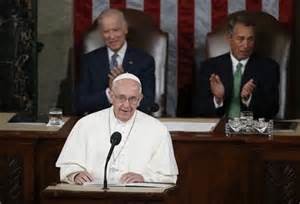 position statement regarding life and abortion, but as it turned out, he was talking about his opposition to the death penalty, a position that runs counter to God’s purpose for it as stated in Genesis 9:6.
position statement regarding life and abortion, but as it turned out, he was talking about his opposition to the death penalty, a position that runs counter to God’s purpose for it as stated in Genesis 9:6.
As I listened to his inter-faith address at the UN, it sounded like an advertisement for his previous call for a new global political authority to save humanity from the impending disaster of climate change. He has made the fight against climate change the central pillar of his papacy, and he is working very hard to unite as much of humanity as possible to get behind that effort. The world will have to unite as it never has before to deal with averting a worldwide catastrophe.
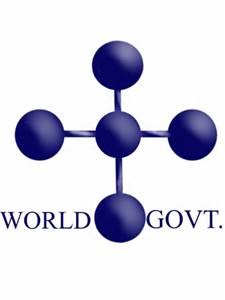 This paves the way for the One World Government described in Revelation. The great barrier to bringing this about is the current sovereignty of nations, each with its own government. What the world needs to move the idea along is a crisis, real or imaginary, that is such a threat that all nations must unite to win the battle for the planet’s survival. It has to be something affecting every nation from the largest to the smallest. Climate change has emerged as the crisis of choice.
This paves the way for the One World Government described in Revelation. The great barrier to bringing this about is the current sovereignty of nations, each with its own government. What the world needs to move the idea along is a crisis, real or imaginary, that is such a threat that all nations must unite to win the battle for the planet’s survival. It has to be something affecting every nation from the largest to the smallest. Climate change has emerged as the crisis of choice.
Pope Francis has also gone on record as saying that homosexuals are not to be judged, proselytism is nonsense, and has endorsed the usage of contraceptive by Catholics. Then there are the Pope’s views on wealth redistribution in the name of humanity, equality, and social justice. Regardless of how you dress it up, it is socialism, pure and simple. As with climate change, he and Obama are in lockstep here. Whether any economic redistribution is good or bad depends on who is doing the redistributing. If it’s voluntary, no problem. Pope Francis, however is pushing for a “legitimate redistribution of economic benefits by the State.”
AS I SEE IT
I’d like to devote the remainder of this article to the Pope’s reference to the great work of Thomas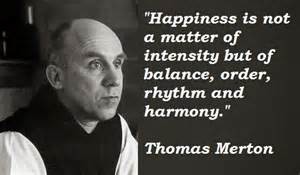 Merton during his presentation to the joint session of congress on Sept. 25. Merton was an American Catholic writer and a Trappist monk. Most importantly, however, he was a mystic. In a discussion with a Sufi (the inner mystical dimension of Islam) master, Merton stated that words and ideas (like those describing the atonement) take us away from spiritual realities such as sharing the experience of divine light, an area where fruitful dialog exists between Christianity and Islam.
Merton during his presentation to the joint session of congress on Sept. 25. Merton was an American Catholic writer and a Trappist monk. Most importantly, however, he was a mystic. In a discussion with a Sufi (the inner mystical dimension of Islam) master, Merton stated that words and ideas (like those describing the atonement) take us away from spiritual realities such as sharing the experience of divine light, an area where fruitful dialog exists between Christianity and Islam.
This is important because of the crucial role mysticism plays in the current movement to bring non-Catholics under the umbrella of Rome by a process known as “The Jesuit Agenda.” This idea is this: if Protestants and evangelicals can be convinced (or seduced) to practice some form of mysticism, especially contemplative, they become conditioned to embrace Rome and its “gathering together” of all religions. Some form of mysticism has found its way into nearly every religion and sect. Mysticism is important, therefore, because it serves as a bridge uniting all the world’s religions.
 To understand the Jesuit Agenda, we must know who the Jesuits are. Not long after the Reformation, the Catholics launched the Counter Revolution to bring the “Separated Brethren” back into the fold. Commissioned by the Pope, the Jesuits were given the task of doing whatever it took to end the Protestant Reformation. Leading the militant charge against the defectors was Ignatius Loyola, the founder of the Jesuit Order in the mid 1500s. Emperor Ferdinand, to satisfy his hatred for the Bohemian Protestants, instituted a high court (conducted chiefly by the Jesuits) to prosecute the reformers. Unlike the Inquisition, this was a mobile court, traveling from place to place with armed soldiers.
To understand the Jesuit Agenda, we must know who the Jesuits are. Not long after the Reformation, the Catholics launched the Counter Revolution to bring the “Separated Brethren” back into the fold. Commissioned by the Pope, the Jesuits were given the task of doing whatever it took to end the Protestant Reformation. Leading the militant charge against the defectors was Ignatius Loyola, the founder of the Jesuit Order in the mid 1500s. Emperor Ferdinand, to satisfy his hatred for the Bohemian Protestants, instituted a high court (conducted chiefly by the Jesuits) to prosecute the reformers. Unlike the Inquisition, this was a mobile court, traveling from place to place with armed soldiers.
Once the court had reached their verdict, there was no appeal. Most cases never made it that far since the soldiers were given permission to murder the Protestants as they pleased as long as they reported their activities to the court. The Jesuits went throughout the world obeying the Pope’s every command which included winning the world with the sword. (In case you forgot, Pope Francis is a Jesuit.) History reveals that the Jesuit Order was regularly performing acts of brutality to bring the world to Christ and the Mother Church, infiltrating every area of society in the process.
With that as background, let’s return to the Jesuit Agenda in action today. While there is no evidence of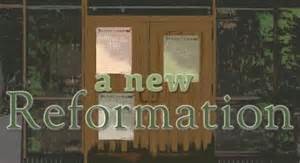 the original brutality in the current version (The Jesuit Agenda), the goal of the Roman Church is still the same-drawing people to the Eucharistic Christ. The agenda is actually the Counter Reformation reborn and it is happening all over America under the name of the “New Christianity” or the “New” or “Second” Reformation as Rick Warren promotes it. The method of reaching the goal has been called Jesuit Spirituality and is characterized by the mystical prayer practices created by the Jesuit founder, Ignatius Loyola. Today, millions of people worldwide practice the “Spiritual Exercises of Ignatius Loyola.”
the original brutality in the current version (The Jesuit Agenda), the goal of the Roman Church is still the same-drawing people to the Eucharistic Christ. The agenda is actually the Counter Reformation reborn and it is happening all over America under the name of the “New Christianity” or the “New” or “Second” Reformation as Rick Warren promotes it. The method of reaching the goal has been called Jesuit Spirituality and is characterized by the mystical prayer practices created by the Jesuit founder, Ignatius Loyola. Today, millions of people worldwide practice the “Spiritual Exercises of Ignatius Loyola.”
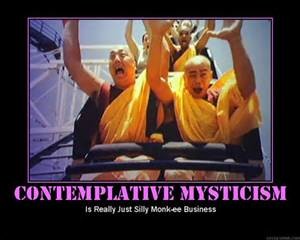 You probably have been exposed to this under other names such as contemplative spirituality and the emerging (emergent) church. Both are spinoffs of the same mystical movement. Authors and proponents of this contemplative spirituality include Anthony De Mello (a Jesuit priest), Richard Foster, Brennan Manning, John Ortberg, Jan Johnson, Philip Yancey, Calvin Miller, Tony Campolo, Bill Hybels, Rob Bell, Mark Driscoll, James Wakefield, and Leonard Sweet, who has partnered with Rick Warren on several occasions. Clearly, the Jesuit Agenda has had a deadly impact on the Church.
You probably have been exposed to this under other names such as contemplative spirituality and the emerging (emergent) church. Both are spinoffs of the same mystical movement. Authors and proponents of this contemplative spirituality include Anthony De Mello (a Jesuit priest), Richard Foster, Brennan Manning, John Ortberg, Jan Johnson, Philip Yancey, Calvin Miller, Tony Campolo, Bill Hybels, Rob Bell, Mark Driscoll, James Wakefield, and Leonard Sweet, who has partnered with Rick Warren on several occasions. Clearly, the Jesuit Agenda has had a deadly impact on the Church.
During the Pope’s address at Madison Square Garden, he used the word contemplate at least twice, brought attention to the poor among us, and stressed that peace comes from accepting others. This is all part of the Jesuit Agenda. It sounds noble and altruistic, but plays right in to hand of the larger agenda-unifying the world’s religions under the banner of Rome.
Is all this nothing but hype? Time will tell, but considering what we know about the Pope, let the reader beware.
A booklet, The Jesuit Agenda, is available at Lighthousetrails.com.
GOD DISPLAYS HIS GLORY



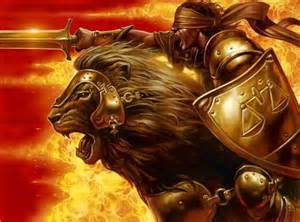


Leave A Comment